U.S. Experts Argue for Tax on Sweet Drinks
Author:Reuters Update Time:2009-04-15
WASHINGTON (Reuters) - A penny-per-ounce tax on sugary drinks could help fight obesity by cutting consumption and raising billions of dollars to help state and local governments pay for programs, two experts said on Wednesday.
Taxes have been shown to reduce smoking and are just as likely to help adults and children choose healthier drinks, which are now usually more expensive than sodas and other sweetened beverages, the experts wrote in the New England Journal of Medicine.
A tax of one penny per fluid ounce (30 ml) on drinks such as soda, sports drinks and sugar-sweetened fruit juice and iced tea could "reduce consumption of sugared beverages by more than 10 percent," Kelly Brownell of Yale University in Connecticut and New York City Health Commissioner Dr. Thomas Frieden wrote.
"It is difficult to imagine producing behavior change of this magnitude through education alone, even if government devoted massive resources to the task."
Studies show that children and adolescents now consume 10 percent to 15 percent of all their calories in beverages.
The soft drink industry also opposes such a tax. Last month the American Beverage Association published a survey showing 70 percent of Americans oppose a national tax on non-diet soft drinks.
The group says a tax could cost jobs in an industry that employs 220,000 people in the United States.
New York was among several states to propose a tax on sugar sodas but the idea proved unpopular and was dropped.
Brownell and Frieden said the tax revenue could be put to good use, raising $1.2 billion in New York state alone.
This could help offset some of the costs that drinking too many soft drinks has imposed on society, they said.
"The contribution of unhealthful diets to healthcare costs is already high and is increasing -- an estimated $79 billion is spent annually for overweight and obesity alone -- and approximately half of these costs are paid by Medicare and Medicaid, at taxpayers' expense," they wrote.
"Sugar-sweetened beverages may be the single largest driver of the obesity epidemic," they added.
"For each extra can or glass of sugared beverage consumed per day, the likelihood of a child's becoming obese increases by 60 percent."
They said tobacco taxes have been effective. One review suggested that for every 10 percent increase in price, consumption decreases by 7.8 percent," they wrote.
Also on Wednesday, Rhode Island raised its tobacco tax by $1 to $3.46 per pack, making it the highest state cigarette tax in the nation. On April 1 the federal cigarette tax went up from 39 cents a pack to $1.01, with the aim of cutting smoking and recouping some of the costs of treating smoking-related disease.
(Reporting by Maggie Fox; Editing by Bill Trott)
 En
En CN
CN

